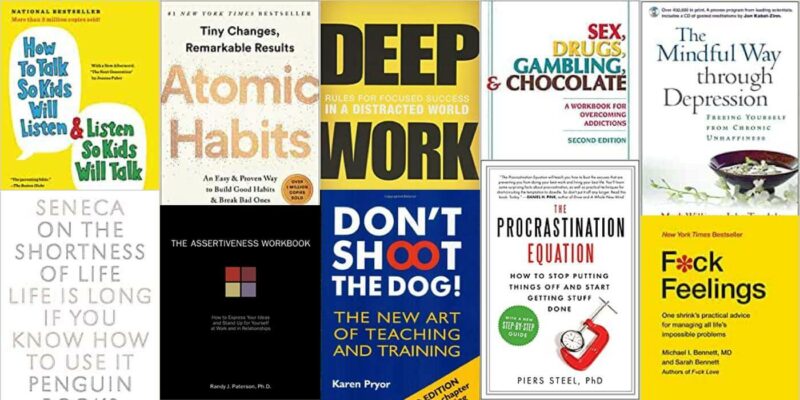I’m a psychologist who specializes in anxiety. And the single biggest reason I see people continue to struggle with anxiety is their mistaken beliefs about what anxiety is and how it works.
Because when you misunderstand what anxiety really is and how it actually works, it’s easy to unintentionally make it stronger.
If you want to feel less anxious, you must unlearn all the unhelpful myths and misconceptions you’ve heard about anxiety.
In the rest of this article, I’ll walk you through 7 of the most common anxiety myths out there.
1. You need to understand the origins of your anxiety
Just because analyzing your past is interesting doesn’t mean it’s helpful.
And the reason comes down to one crucial distinction:
The initial cause of your anxiety is rarely the maintaining cause of your anxiety.
For example: Let’s say you can trace your anxiety back to your parents’ contentious divorce when you were 6-years-old. That may well have been the event that triggered or set in motion your anxiety. But your parent’s divorce is not causing your anxiety right now as an adult.
Your anxiety is being caused by your habits in the present—chronic worry, for example, or obsessive reassurance-seeking. And until you address those maintaining causes, your anxiety will persist.
So by all means explore and process the origins of your anxiety in the past. But don’t make the mistake of thinking that that will address what’s causing your anxiety in the present.
2. Anxiety is dangerous
Just because something feels bad doesn’t mean it is bad.
For example: Muscle soreness after a good workout feels bad but it’s actually a good thing—it means your muscles are growing and strengthening. Well, anxiety falls into the same category as muscle soreness—it feels bad but isn’t actually dangerous.
See, anxiety is just a form of inaccurate or misguided fear. And like all uncomfortable emotions, while sometimes painful and scary, fear and anxiety themselves can’t hurt you directly.
Of course, that doesn’t mean there aren’t indirect and long-term risks associated with anxiety. Over time, anxiety can lead to chronic stress, for example, which is associated with a variety of poor outcomes.
But here’s the key insight about anxiety you need to know:
When you worry about anxiety, you teach your brain to believe (incorrectly) that anxiety is dangerous, which only makes you more anxious!
Worrying about the dangers of anxiety in the moment is the very thing that leads to long term anxiety and the potential risks it confers.
The best way to not get stuck in long term anxiety is to stop worrying about your anxiety in the moment and be accepting of it instead.
3. You need coping skills to manage your anxiety
Here’s the problem with coping skills:
They provide short-term relief from anxiety at the expense of long-term suffering.
For example:
- Let’s say that whenever you feel anxious you immediately close your eyes and do a mindfulness meditation as a way to cope with your anxiety.
- That may help distract you from the anxiety or make you feel calmer in the moment.
- But by immediately doing something to try and get rid of your anxiety, you’re teaching your brain that it’s not okay to feel anxious—that anxiety is bad.
- This means that the next time you feel anxious, you’re now going to feel anxious about being anxious!
As we discussed, anxiety is not dangerous. But if you treat it like it is—by immediately trying to get rid of it with coping skills—you’re training your brain to fear fear itself. And that is a set-up for much worse anxiety long-term.
4. Anxiety is a weakness
A lot of people are raised to believe that feeling anxious is a sign of weakness:
- As a child, maybe your parents or siblings criticized you whenever you mentioned feeling afraid.
- Or maybe you watched someone else who was nervous and afraid be shamed for it—like one parent who was constantly being mocked for their timidness or fear by the other parent.
Whatever the origins of this belief, it can be surprisingly hard to shake. Because while many people can acknowledge intellectually that feeling anxious isn’t a sign of weakness, they still feel that way experientially, especially in the moment.
For example: Let’s say you just gave a presentation at work. But you got really anxious at one point in the presentation because you mixed up some information. As a result, you spend the rest of the day ruminating and worrying about it:
- That was really stupid that I mixed those clients up and then got so muddled!
- I can’t believe I got so flustered… Why can’t I be more confident like the rest of them?!
- I’m sure they think I’m unreliable now because that’s the second time in a week I’ve gotten visibly anxious in front of the team.
Even though intellectually wouldn’t say that anxiety is weakness, your self-talk in the moment suggests otherwise. And critically, if that’s how you respond to anxiety—with lots of worry and negative self-talk—that’s what your brain is going to continue to believe.
5. Anxiety is just something you’re born with
One of the most common things I hear from people who want to stop feeling so anxious is that they’re afraid it will never change because that’s just who they are…
- I want to be less anxious but maybe that’s just how I’m wired?
- My grandmother was anxious, my mother was anxious, maybe I’m just born anxious too?
- I’ve always been an anxious person. I probably just have the gene for it.
Look, there is no anxiety gene that predetermines who will struggle with anxiety and who won’t. At most, the research suggests that about 30% of a person’s proclivity for anxiety is based on heritable factors. But even then, it has more to do with how basic temperament interacts with early experiences—nobody pops out of the womb worrying and fretting!
By and large, anxiety comes from learning and experience. Either through modeling at an early age or experience, we develop certain habits like worry and avoidance that lead to long-term anxiety.
The good news is that what is learned can be unlearned. And no matter what happened in your past to create the habits of anxiety, it’s always possible to build new habits in the present.
6. Worry and anxiety are the same thing
Worry and anxiety are very different things. And understanding the difference is key to lowering your anxiety long-term.
Worry is a thought or series of thoughts:
- Oh my God, what if he thought I was insulting him with that last comment?
- I’ll never get that promotion…
- My chest feels funny… I’m probably having a heart attack
Anxiety is an emotion or class of emotions:
- Feeling nervous before a big performance
- Feeling terrified that you’re going to have a panic attack
- Feeling on-edge in a room full of new people
This distinction between worry as a form of thinking and anxiety as an emotion is crucial because you can control your thinking but you can’t control your emotions—not directly, anyway.
- Difficult as it is sometimes, it is possible to stop worrying and redirect your attention and thinking onto something else.
- But you can’t directly control your emotions, anxiety included—there’s no anxiety lever you can just pull to reduce how anxious you feel.
You can only change your emotions indirectly, primarily by changing how you think.
Most people start to feel anxious and try to make their anxiety go away. But this backfires spectacularly and only serves to make you afraid of your own anxiety! At the same time, people tend to ignore their worrying because it feels like something they can’t control. But here’s the thing…
Controlling your worry is the only way to control your anxiety.
Ironically, the best way to free yourself from anxiety is to learn to let go of your desire to control your anxiety and instead practice taking control over your worry.
7. It’s all in your head
Even though worry is the only direct cause of anxiety, that doesn’t mean anxiety is all in your head.
One of the biggest reasons people get stuck in patterns of chronic worry—and all the anxiety it produces—is that they aren’t very good at managing their relationships. More specifically, they aren’t assertive enough and don’t know how to set healthy boundaries.
A lot of anxiety stems from unhealthy relationships.
Think about it:
- If you struggle to ask for what you want assertively, you’re going to be constantly worrying about keeping other people happy—and at the same time, ignoring your own wants and needs.
- If you struggle to set (or enforce) healthy boundaries, you’re going to be overwhelmed with other people’s requests and demands—which is going to lead to a lot of worry and anxiety.
Sometimes the best way to reduce your anxiety is to get out of your own head and look at your relationships with other people instead.
Ready to end chronic worry and anxiety for good?
Whenever you’re ready, I teach a course called Creating Calm: Transform Your Mindset from Anxious and Worried to Confident and Calm. This comprehensive course will teach you the exact step-by-step system I’ve used to help hundreds of people end chronic worry and anxiety for good. Learn more about the course here →





22 Comments
Add YoursInsightful reads’ Thanks Nick.
The fact that past events that happened aren’t the ones causing me to have anxiety at the present, I’m grateful for the reminder to let go, in a way that’s practical.
Please could you share the solutions!
Great article explaining the difference between worry and anxiety.
Thank you
Great article to read, really gives a new perspective about mental health.
thank you I always thought it was anxiety but most could just be worry ????
What’s the difference between a coping skill and an activity like writing down worries as a way to deal with anxiety?
Good question! It’s about the motivation behind it. If your motivation is to actively get rid of the anxiety, then it’s a coping mechanism and probably counterproductive long term. If the motivation is to investigate and approach the worry (and anxiety), then it’s not avoidance/coping—at least in the way I think about these terms.
I’ve been a therapist for 35 years. There is maladaptive coping (i.e. most avoidance such as efforts to “get rid of” a feeling) and effective, adaptive coping- like acceptance and tolerance of uncomfortable feelings.
Avoidance and coping are not synonymous.
Thank you for such pertinent and insightful reads! Your articles are immensely helpful.
Great article as usual. Wish you were in south africa
Always appreciate my Monday readings a wonderful antidote against my existential angst. Insightful tools that enable greater awareness and in the process fashion better coping skills towards a more fulfilling life Thank you
Always appreciate my Monday readings a wonderful antidote against my existential angst. Insightful tools that enable greater awareness and in the process fashion better coping skills towards a more fulfilling life Thank you
This information is interesting but I’m confused. I was under the impression that attachment starts in the womb and so babies can become anxious if mum’s are anxious- therefore being born anxious. Also inner child work involves looking back in your life to when you haven’t received the support you need and relating to that inner child, however this writing suggests that there is no point doing this.
Another good article. Love the distinction between worry and anxiety.
Think spelling mistake in Section 3 using the word don’t instead of not?
Nick, I just started to read your posts. You are so insightful! I’ve been to so many mental health counselors that I’ve become a little cynical about the whole process. I really enjoy reading your articles! Thank you!
It is helpful and in this moment in time it’s always good
Really enjoyed this article. Different perspectives I never thought about.
I very grateful for this. Thanks.
I’ve recently started therapy and fully appreciate your reads! Thanks Nick ????
When you say anxiety is not dangerous and is not bad, I can’t agree because the anxiety emotion is why I have insomnia that is chronic and it is what keeps me up at night. If I had no anxiety (no dread of another sleepless night) my fear response would not get triggered and I would drift off to sleep. As it is, anxiety and dread causes a vicious circle of sleeplessness, more anxiety, more sleeplessness and so on… Very bad indeed!
Katharine, I know how awful it is to have insomnia. Mine got kicked off by anxiety and worry over relationship issues. Then it became self fed by the fear of not sleeping. Check out Martin Reed aka the Insomnia Coach. I found him through a podcast he did with Nick. His thoughts on insomnia helped me look at it in a different way. I still have some sleepless nights but my sleep has improved greatly. Good luck